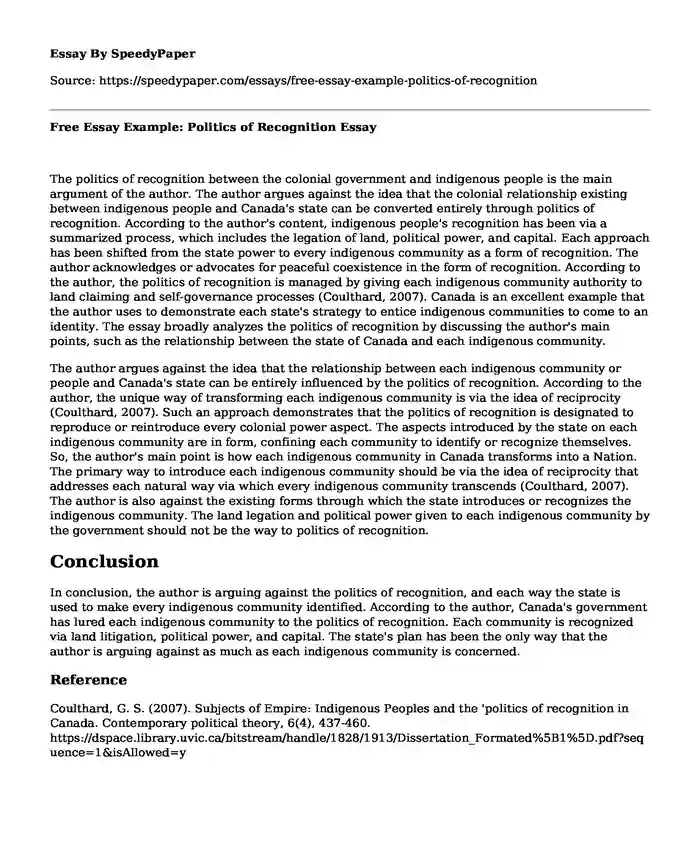
| Type of paper: | Essay |
| Categories: | Technology Other Essays by pagecount |
| Pages: | 2 |
| Wordcount: | 452 words |
The politics of recognition between the colonial government and indigenous people is the main argument of the author. The author argues against the idea that the colonial relationship existing between indigenous people and Canada's state can be converted entirely through politics of recognition. According to the author's content, indigenous people's recognition has been via a summarized process, which includes the legation of land, political power, and capital. Each approach has been shifted from the state power to every indigenous community as a form of recognition. The author acknowledges or advocates for peaceful coexistence in the form of recognition. According to the author, the politics of recognition is managed by giving each indigenous community authority to land claiming and self-governance processes (Coulthard, 2007). Canada is an excellent example that the author uses to demonstrate each state's strategy to entice indigenous communities to come to an identity. The essay broadly analyzes the politics of recognition by discussing the author's main points, such as the relationship between the state of Canada and each indigenous community.
The author argues against the idea that the relationship between each indigenous community or people and Canada's state can be entirely influenced by the politics of recognition. According to the author, the unique way of transforming each indigenous community is via the idea of reciprocity (Coulthard, 2007). Such an approach demonstrates that the politics of recognition is designated to reproduce or reintroduce every colonial power aspect. The aspects introduced by the state on each indigenous community are in form, confining each community to identify or recognize themselves. So, the author's main point is how each indigenous community in Canada transforms into a Nation. The primary way to introduce each indigenous community should be via the idea of reciprocity that addresses each natural way via which every indigenous community transcends (Coulthard, 2007). The author is also against the existing forms through which the state introduces or recognizes the indigenous community. The land legation and political power given to each indigenous community by the government should not be the way to politics of recognition.
Conclusion
In conclusion, the author is arguing against the politics of recognition, and each way the state is used to make every indigenous community identified. According to the author, Canada's government has lured each indigenous community to the politics of recognition. Each community is recognized via land litigation, political power, and capital. The state's plan has been the only way that the author is arguing against as much as each indigenous community is concerned.
Reference
Coulthard, G. S. (2007). Subjects of Empire: Indigenous Peoples and the 'politics of recognition in Canada. Contemporary political theory, 6(4), 437-460. https://dspace.library.uvic.ca/bitstream/handle/1828/1913/Dissertation_Formated%5B1%5D.pdf?sequence=1&isAllowed=y
Cite this page
Free Essay Example: Politics of Recognition. (2023, Dec 20). Retrieved from https://speedypaper.net/essays/free-essay-example-politics-of-recognition
Request Removal
If you are the original author of this essay and no longer wish to have it published on the SpeedyPaper website, please click below to request its removal:
- Free Essay on Economic Growth and the Environment
- Religion Essay Sample: The Help of Hospitals in New France with the Conversion Process
- Essay Sample: Mekong River and Environmental Concerns
- Essay Sample about Persuasion in English
- Free Paper Sample on Arts and Culture Management
- Essay Example. Effects of Afghanistan War on People
- Free Essay: Training Leaders to Have Effective Leadership
Popular categories




